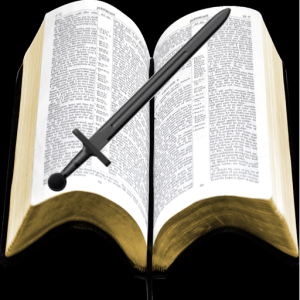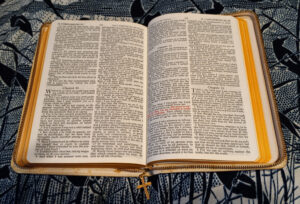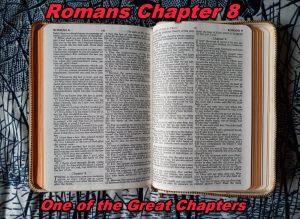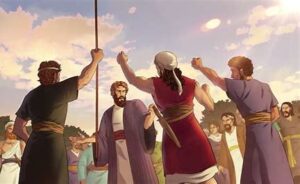When comes to Rightly Dividing God’s Word, these verses are Key.
To understand this more clearly I am going to use Les Feldick Book study 3-3-3. Below is an Audio of his. He teaches much more on the covenant at LesFeldick.org I have highlighted in Red the item that help me understand the importance of these verses.
Understanding these Covenants is key to seeing how God has a special purpose for Israel that still needs to be fullfilled. He starts with Genesis and then Exodus 1 and Exodus 19 explain the Covenant. and Zechariah details purpose.
He goes Paul’ Book of Galatians then back to Isaiah 42:1
Audio From Lesfeldick.org
LESSON THREE * PART III
ABRAHAMIC COVENANT
GENESIS 12:1-3
We’re going to pick up more or less where we left off in last lesson, but before we start on a real in depth study of the Abrahamic Covenant, which I have mentioned in previous lessons is so basic to understanding all the rest of God’s program for the ages and the change of God’s dealing with the human race as we come into Genesis chapter 12, I need to show you some important verses that help make all this connect.
Now within that Abrahamic Covenant remember, we have these three basic premises: 1. That He’s going to make of them a Nation of people. 2. He’s going to put them in a geographical area. He’s going to give them their own land. 3. And over that people dwelling in their own land, He’s going to provide them with a government. Not just an ordinary government, not even kings such as David and Solomon. But that one day, God Himself would become their King in the person of the Messiah, the Christ.
And consequently that’s why when we come to the book of Matthew, He is referred to as the King of Israel. Now that wasn’t just a frivolous term. This was all part and parcel of this Abrahamic Covenant. All right, Genesis chapter 46 is where we closed last week, where God said to Jacob as he was hankering to get down in Egypt where Joseph was, He said:
Genesis 46:3b
“…I am God, the God of thy father, fear not to go down into Egypt;…” Now the reason it’s spoken in the way that it is, God, up until this time, has instructed them not to go to Egypt. Because you remember, Egypt in Scripture is a picture of what? Of the world. Sinfulness. Absolutely. And so now God has come to the place where He can permit Jacob to go on down to Egypt with his sons and their wives and their family and Joseph and his family are already there – so for a total of 70 some souls, will move down into Egypt and then look what it says:
Genesis 46:3c
“For I will there (in Egypt) make of thee a great nation.”
Now then if you’ll come to the Book of Exodus, and we’ll be studying this in detail when we get there chronologically, but you’ll see in Exodus chapter 1 drop down to verse 5 where it says:Exodus 1:5
“And all the souls that came out of the loins of Jacob were seventy souls: for Joseph was in Egypt already.” And then verse 7.Exodus 1:7
“And the children of Israel were fruitful, and increased abundantly, multiplied, and waxed exceeding mighty; and the land (that is the land of Egypt, Goshen in particular) was filled with them.” And so they began to just multiply until finally, verse 9:
Exodus 1:9
“And he (the king of Egypt) said unto his people, Behold the people of the children of Israel are more and mightier than we:“ So the King had to do something drastic.
Now if you’ll turn on over to Exodus chapter 19, one of the other benchmark verses of Scripture. A verse I dare say that most nominal Christians don’t even realize is in their Bible. But it is such an important verse in light of this covenant that we’re studying. In Exodus chapter 19 drop down to verse 5 and again get the setting. Israel is now out of the land of Egypt. They have come through the Red Sea experience. They are gathered around Mount Sinai and in chapter 20 they’re going to receive the Ten Commandments. But just before God gives the Commandments to Moses, look what He tells this nation of people.
Exodus 19:5a
“Now therefore, if….” Now what kind of a word do we call that in English? Conditional, isn’t it? If. It’s going to be up to them.Exodus 19:5b
“…if you will obey my voice indeed, and keep my covenant, (see how many times that word comes up) then you shall be a peculiar…” Now the word peculiar in its original is not as we think of as someone odd or a little bit different. But, the word in its original language was of intrinsic value. You shall be a special people.
Exodus 19:5c
“…treasure unto me above all people: for all the earth is mine:” Why? Because God is Sovereign. He can do any way He wants to do. Now look at verse 6, underline it, circle it, do something with it because this is a crucial verse if you’re going to understand even the New Testament.Exodus 19:6a
“And you (the nation of Israel) shall be unto me a (what’s the next word?) kingdom of priests,…” Now let’s stop. As we understand the word priest, what is the role of a priest? So far as God and man are concerned, what’s the role of a priest? He’s a go-between, isn’t he? Now we’re not acquainted with that so much, especially protestants. Now our Catholic friends understand it a little better than we do because after all isn’t that what they think of in terms of their priest? He’s the go-between between them and God. Now that’s the term priest.
Now Israel was being promised that if they would be obedient to the commands and the covenants of God, they would be a kingdom, a nation of priests – go-betweens.
Exodus 19:6b
“…and an holy (now that word holy means separated. It doesn’t mean perfect but it means separated. A holy or a separated – what’s the next word?) nation.” Now there’s plain English. Israel is a large enough group of people now brought out of Egypt, God is going to give them the Commandments, He’s going to give them the system of worship, which we now recognize as the system of Law, the Temple and all the rest of it. But the whole idea of this thing is that they were to become a nation of go-betweens.
Now the best verse I guess that I can show that would be a fulfillment of that, if you’ll go all the way back to Zechariah. Zechariah is the next to the last book in your Old Testament, and come down to chapter 8. Zechariah chapter 8 and try to keep all this sorted out now in your memory – that Israel had become a nation of people while they were down there in Egypt. God has miraculously brought them out, they’re around Mount Sinai ready to be given the very system that’s going to prepare them for this role. They are now a nation of people and He is promising that they can be priests of God, they could be the go-betweens, not just between each other but between themselves and again, this river of humanity.
Now remember the whole idea of separating this little nation of people is to prepare them for the day when they could be all that God wanted them to be with regard to the non-Jewish people, which we normally refer to now as Gentiles.
Zechariah 8:20
“Thus saith the LORD of hosts; It shall yet come to pass, (now it hasn’t yet, it’s still future, but of course in Zechariah’s time, we’re back there about 450 BC but we could still say it’s appropriate, because it never did happen up till now) that there shall come people, and the inhabitants of many cities; 21. And the inhabitants of one city shall go to another, saying, Let us go speedily to pray before the LORD (or Jehovah) and to seek the LORD of hosts; (and these people will say) I will go with you also.”
Zechariah 8:22
“Yea, many people and strong (what’s the next word?) nations (I’m a stickler for every word. So we have people and nations – plural) shall come to seek the LORD of hosts (where?) in Jerusalem, and pray before the LORD.” Not heaven, but in Jerusalem. Oh, it’s going to be the center of all this activity. Now verse 23, I think most of you who have been in my classes longer, you’ve already got this well underlined.
Zechariah 8:23
“Thus saith the LORD of hosts; In those days (what days? When God is finally using Israel to evangelize the nations) it shall come to pass that ten men shall take hold out of all languages (around the world, every tongue and tribe and nation of people) of the nations, even shall take hold of the skirt of him that is a Jew, saying, We want to go with you for we have heard (what?) God is with you.” That’s where everything is happening. And this is what Israel had in her future. Oh she could come to the place where ten men to one would say, “Can we go with you and go back to Jerusalem and meet this God of yours that we can have fellowship with Him as you do?”
Wasn’t that tremendous prospect and Israel blew it! But oh I want you to see that this was the potential all the way up through the Old Testament. Another verse just came to mind a moment ago. Maybe let’s go to the New Testament, I don’t think it’s the verse I had in mind but let’s go to Galatians. Come to Galatians and I’m just trying to sort out and see what we can use the quickest and which would be the clearest. I think chapter 3. in Galatians and just drop down again for sake of time to verse 23 and 24.
Now of course, Paul again is writing to predominately Gentile people but he is stressing why everything happened the way it did. Why has the Law now been set aside and why had God turned to the Gentiles by grace through faith alone?
Galatians 3:23-24a
“Before faith came, (or the faith way came) we (speaking as a Jew) were kept under the law, shut up (confined) to the faith which should afterwards be revealed. 24. (this says it all.) Wherefore the law was our (what’s the word?) schoolmaster…” Now what in the world is the role of a schoolmaster? Oh, it’s to teach your kids.
And why do we educate our children? To be prepared for a role in adult life, isn’t it? That’s the whole reason parents scrape and save and put their kids through school and my when I see the cost of some of these universities lately! But why do parents do it? To prepare that child for an active life when he becomes an adult. That’s the role of a schoolmaster. All right, now that’s what the Law was to Israel.
Galatians 3:24b
“…to bring us unto (or to bring us to the time of the Messiah) Christ, that we might be justified by faith.” Without the law. But now then if you’ll come down to chapter 4 it’s a further clarification of this thought. Galatians 4:1
“Now I say, that the heir, as long as he is a child, differeth nothing from a servant, though he be lord (now that’s small ‘l’ it’s just a term) of all; 2. But (this child) is under tutors and governors (teachers. Private instructors) until the time appointed of the father.” Now you know what Paul is referring to? Back in the Roman Empire especially, well-to-do families would do just that.
This little boy as he came into the family meant nothing, he had no more rights than a hired servant except that old daddy is going to foot the bill to get him educated. And he’s going to educated him for a particular future role, probably within the family business or within the estate, or whatever the case may be. But he’s going to be educated by tutors for that time when the father says, “Now I’m ready son to bring you in as a full heir, I’ve got a job for you to do.”
All right, now this was exactly what God was doing with the nation of Israel. He puts them under the Law. He teaches them, He deals with them miraculously and patiently and He’s moving them along, for the day when they could become the great evangelistic force amongst the Gentiles.
Now, I know the other verse I was thinking of. Let’s back up again in the Old Testament, all the way to Isaiah because I want you to be able to see that God was not negligent in letting this mainstream of humanity go its way. Oh He had them on His mind all the while, but He had to let them go until He had tutored, until He had prepared this Covenant people of Israel, to fulfill the role that He had given to them. But in Isaiah 42 starting with verse 1 where Isaiah, and, I always like to remind people who hear me teach, to whom is Isaiah writing? To Israel. He doesn’t write to the Romans or the Greeks, he’s writing to the Jew. They were the only ones that had anything to do with the Old Testament writing. So always keep that in mind.
Isaiah 42:1
“Behold my servant, whom I uphold; my elect, in whom my soul delighteth; I have put my Spirit upon him; he shall bring forth judgment to the Gentiles.” And the word judgment here does not mean punishment as we think of the term, but he would bring forth rule. To whom? Gentiles. But of whom is the prophet speaking? Christ. The Messiah, this coming King. And who was he intrinsically interested in? The non-Jew, the Gentile.
Now if you’ll flip on over to chapter 59 in this same book of Isaiah chapter 59 now drop down to verse 20.
Isaiah 59:20a
“And the Redeemer (capitalized, who’s the Redeemer? Christ. The Messiah) shall come to Zion,…” Where’s Zion? Jerusalem. Now you know I’ve made this statement in my classes. Hymn writers, bless their heart, some of them though have got awful theology. And they give the idea as we sing the song, “Marching to Zion,” haven’t heard it now for a long time, but you all have sung it at one time or another. When we listen to the song and we sing it, where to we think of as Zion? Well, Heaven. But Zion isn’t in Heaven. Zion’s the north side of Jerusalem. And so this is the Zion that Isaiah is referring to
Isaiah 59:20b-21
“…and unto them that turn from transgression in Jacob,…” (that is of the Children of Israel) 21. As for me, (God says) this is my covenant with them, saith the LORD; My Spirit that is upon thee, and my words which I have put in thy mouth, shall not depart out of thy mouth nor out of the mouth of thy seed, or your children, nor out of the mouth of thy seed’s seed, saith the LORD from henceforth forever.” But now don’t stop there, come right into the next chapter, chapter 60 verse 1, where it says:
Isaiah 60:1
“Arise, shine; for thy light is come, and the glory of the LORD is risen upon thee.” Now who is the “thee?” Israel. What time is it referring to? When their Messiah was there. You remember in the Gospels when Jesus told Israel, “you are the light of the world?” Couple of verses down, it says, “you are the salt of the earth.” What was He talking about? They were to be the vehicle. All right, now let’s come back here to Isaiah 60.
Isaiah 60:2-3a
“For, behold, the darkness shall cover the earth, and gross darkness the people: (now who are the people? Israel. The Jew. And hasn’t that been true? Spiritually blinded. And so God foresaw all this) but (there’s that three lettered word that makes the difference) the LORD shall arise upon thee, (for what purpose?) and his glory shall be seen upon thee 3. And the (what?) Gentiles shall come to (what?) thy light,…” Israel’s light? See it? Oh the Gentiles were to see all the spiritual light through Israel.
Isaiah 60:3b-4
“…and his glory shall be seen upon thee, 4. And the Gentiles shall come to thy light, and kings to the brightness of thy rising.” This is all in that prophetic program. But as I said before and I’ll say it again, Israel blew it. They just totally rejected it and they couldn’t understand it and as Paul writes in Corinthians, they didn’t know who He was.
Now those of you who have been with me again over the years, you’ve heard me say it over and over, Israel should have known who Jesus was. Israel could have known if they’d have just gone back to the Book. But Israel did not know. And so Paul can write in Corinthians that the wisdom of this world was just not comparable to the wisdom of God. And then he says, so clearly, “that had the rulers of this world, had the rulers of Israel, had they known who Jesus was, They would not have crucified the Lord of glory.”
So why did they crucify Him? They didn’t know who He was. And I maintain then for those of you that want to read on ahead of me or study on ahead, when you get to those early chapters of Acts, what is the great burden of the Apostle Peter? Oh, to stress to the Jew who it was that they had murdered. And that’s the word he uses in Acts chapter 2 and Acts chapter 3. And he says, “He was the Promised One, but God raised Him from the dead.” And Israel still couldn’t believe it. It’s just beyond our comprehension but they could not believe who He really was.
All right, now then, if you’ll come back to Genesis 12 and let’s just take another little run then at some of these other verses with regard to the Abrahamic Covenant. Now, in this Abrahamic Covenant, God has established the fact that the nation of Israel is now on the scene. They have come out of Egypt, several million strong, now the next thing I want you to understand is that God is going to provide them with a piece of land, a part of this old earth’s topography. To show you that, turn to Genesis 15. We’re not going to get far on this segment, but we’ll get started. Hopefully we’ve established that they were to be a nation of People. But now God’s going to put them in a geographical area.
And this is the sore spot of the whole Middle East tonight. That’s why it’s so appropriate that we’re studying this Covenant in light of the prophetic aspect as well as the here and the now. Genesis chapter 15, the very same verses are appropriate that we read earlier, where Abram is wondering, “How is God going to bring this about, seeing that he’s childless.” Now if you’ll come down to verse 8. Last time we looked at these verses he was talking about numbers, people. He said, “as the stars are numbered, so are the people that will come of thee.” Now, verse 7:
Genesis 15:7
“And he said unto him, I am the LORD that brought thee out of Ur of the Chaldees, to give thee this (what’s the next word?) land (here it comes. Now we’re talking about real estate. Regular old terra firma) to inherit it.” And old Abram is so human, he comes right back and what does he say?
Genesis 15:8
“And he said, Lord GOD, whereby shall I know that I shall inherit it?” You can just hear old Abraham, “Yeah, but Lord, how do I know that? How do I know I’m going to inherit the land? You haven’t given me any guarantees other than Your word.” We’ve got to give Abram credit, he was a man of faith, but even a man of faith still says what? Show me some proof.
Well, we haven’t got time to go into all of this with just one minute left and we come down through these verses that I call the signing of Israel’s deed. That’s verses 10 down through verse 18, but now look at those closing three verses and with this we’ll have to stop.
Genesis 15:18“
In the same day the LORD made a covenant with Abram, saying, Unto thy seed I have given (past tense) this (what’s the word?) land, (now look how big it is and we’ll show you on the board perhaps next week) from the river of Egypt unto the great river, the River Euphrates:”
God tells Abraham, “I have given you this land, from the River of Egypt to the Great River Euphrates, and He lists all the Canaanite tribes, the Amorites, the Canaanites, the Girgashites and the Jebusites.” Whose land is it now? Israel’s! And the Canaanites are going to have to be driven out so that Israel can inherit the land that God deeded to Abraham.
My Thoughts
This is the lesson I began understanding the purpose to Rightly divide the word what is for Israel and what is this age of Grace.





